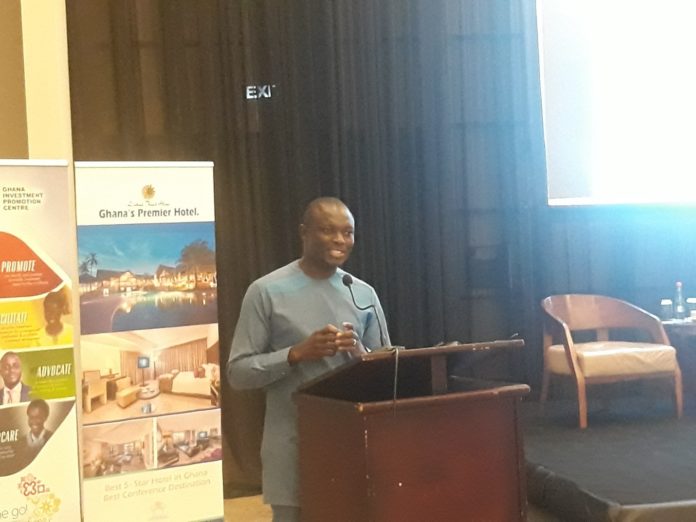 Kweku Kwarteng – Dep. Finance Minister
Investors
or business promoters in the country seeking tax reliefs have been
urged to consider ceding
Kweku Kwarteng – Dep. Finance Minister
Investors
or business promoters in the country seeking tax reliefs have been
urged to consider cedingpart of their business to government in return for such reliefs, Deputy Finance Minister Kweku Kwarteng has said.
“Are you willing to give up a little of your business – say 20-30 percent – to government, and in return we grant you tax exemptions? I would love to see investors put this proposal before us, then we’ll know, indeed, those investors are passionate about investment. We want proposals like that, and then we can look at the numbers,” he said.
He was speaking at the 2nd Quarter Edition of the Ghana Investment Promotion Centre’s ‘Ghana on the Go’ CEO’s Breakfast Meeting held under the theme ‘Assessing the Tax Exemptions Regime: Benefits and Disadvantages’.
According to the minister, tax reforms conversations in this direction are ongoing, and government is seeking proposals like that to work with.
“We agree that if we are going to grant tax exemptions, then it must not just be tax exemptions for people who just have applied.
“We will not cancel the exemptions, but we will rationalize them s to take out those which in our opinion are counterproductive. There are exemptions that our studies show are not leading to any benefits for the economy. It is government’s intention to take out those exemptions.”
Furthermore, he pointed out that even when businesses are big and are investing in the economy, government should not grant exemptions for big investors just because they have applied for them or because they have invested beyond a certain threshold.
They are looking to target specific sectors of the economy and to say, if you are willing to move here government wants to partner you by giving up some of the revenue that you would have collected for that purpose.
If entities come to government saying “we have a good business but without exemptions that business may not be viable”, then the reason government will want some presence is to ensure that the value lost by the state via tax exemptions is at least quantified and recorded, so that any time you feel your business is strong on its legs and you are willing to have your business as a whole, you should be able to come to government and recoup your shares so the taxpayer will feel they are not losing out.
Businesses are keen for government to ensure a tax regime that is stable, not a varying regime, Mr. Kwarteng noted, saying this has been the feedback from businesses.
He also added that unless government fixes its fiscal difficulties – which in a large part have to do with revenue mobilisation – the country will not be successful in this kind of environment trying to keep or grow businesses.
Additionally, he maintained that the default thinking of the nation should be payment of taxes; stressing that companies or businesses should be slow to ask for tax exemptions and be rather compliant with tax laws.
Abeiku Gyan-Quansah, a tax partner at PwC, indicated that for future outlook government should consider submitting an Exemptions Impact Report to determine how many jobs were created, investments among others.
He also urged the Ghana Revenue Authority to ensure effective monitoring to avert abuse in the system, as well as advocating passage of the Exemptions bill, 2019, into an Act.
Additionally, he indicated that the Exemptions bill, 2019, revealed that in 2018, 1.6 percent of the income earned by workers was given as tax exemptions; approximately 0.6 percent of taxes collected is the equivalent of tax exemptions granted.
“In 2018, for every cedi that we collected 12 pesewas of that is the equivalent of the tax that we give; but the challenge I have is that I am still yet to see a public document from the ministry that clearly explains what tax exemptions are and how they are determined.”
The Ghana Revenue Authority (GRA) missed the 2018 tax revenue collection target of GH¢39,802billion by GH¢2171.73million – representing a negative variance of 5.5 percent.
They collected GH¢37,630.54billion – representing 94.5 percent of the target.
For 2019, the GRA has hinted at revising upward the GH¢45.4billion tax revenue target for the 2019 fiscal year.




الرؤية والرسالة
ReplyDeleteتسعي الجامعة إلي توفير مقومات التطوير المستمر لمواكبة التطورات العلمية والتكنولوجية المتسارعة ، وتجويد الأداء الجامعي ، وتعمل الجامعة علي تحقيق رسالتها من خلال
إعداد الكوادر الفنية المتخصصة في مختلف المجالات التي تقابل احتياجات المجتمع وتتطلبها مجالات التنمية الشاملة
• وتوفير المؤهلين في التخصصات المستحدثة التي يتطلبها سوق العمل
• إجراء البحوث والدراسات العلمية والتطبيقية التي ترتبط بمشكلات المجتمع وبرامج التنميـة
• التأكيد علي القيم الإنسانية النبيلة وتعميق قيمة الولاء الوطني والمحافظة علي المبادئ الأصيلة للمجتمع
• دعما لروابط الثقافية والعلميةبين الجامعة والمؤسسات العلمية والجامعات العربية والعالميةوتوثيقها
• التطوير المستمر للبرامج الدراسية وبرامج الدراسات العليا لمواكبة التقدم العلمي والتكنولوجي
• تقديم الخبرات الاستشاراية للهيئات والمؤسسات الانتاجية من أجل خدمة المجتمع وتنمية البيئة
جامعة المنيا
Minia University
Université de Minia
Universidad de Minia